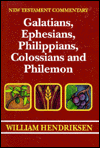Inheritance
At our last Studio 215 Bible study meeting, we covered Ephesians 1, and I thought I'd share some thoughts on this great passage with you. (This is a slightly edited version of the post available at the Studio 215 MySpace.)
It can be awfully easy to miss the theological grandeur and epic historical sweep of the portrait Paul so breathlessly paints in the chapter. It's an inherent danger in all detailed Bible study, sort of a "forest for the trees" type of thing. But in this chapter, and in the chapters following, Paul paints with broad strokes, expressing a great dizzying sense of what it means to be a Spirit-sealed, Christ-worshiping child of the living God. As we mentioned, Ephesians parallels Colossians in a lot of ways, but Ephesians highlights the major notes and plays them more loudly. Colossians is like Paul as DaVinci; Ephesians is like Paul as Van Gogh. And if you don't know the difference, look up paintings by both of those artists and see for yourself.
The idea I see most prevalent in Ephesians 1 is this idea of inheritance. It is an idea that would have a lot of resonance for the letter's recipients. For one thing, inheritance features prominently in the ancient stories of the Israelite faith. And just culturally speaking, inheritance was a concern in many families. At the same time, inheritance conjured up plenty of applications to the culture Paul was writing to at the time. Ephesus, as a Roman provincial capital and a place of major business and trade, placed its Christians in the muck and mire of Roman commerce and even its interconnection with the paganism of the day. The world Paul was writing to loved money, and when you factored in the polytheism of the culture, in which one might "prosper" personally and professionally depending upon which god you honored or which god presided over your family or business, it's not a stretch to think plenty of Christians felt pressured from within and without to attribute their relative poverty to a lack of divine blessing.
Notice that many Bibles place a subtitle in Ephesians 1 that reads "Spiritual Blessings" or something similar.
So Paul is concerned first with declaring the sovereign control of the one true God, the God of Jacob, who not only guided and presided over the patriarchs of the Old Testament, but is alive and faithful and in control over the world of Jew and Gentile believers under Roman oppression. (Keep in mind that many Jews believed the arrival of the Messiah would free them from Roman governance, and so this was a major stumbling block in the culture for the acceptance of Jesus as the messiah. If he was the messiah, why was Caesar still king?)
Paul's not just talking out of his rear with all the stuff about God putting all the rulers and authorities under heaven, in this age and the age to come, under the feet of Jesus. He's assuring them that looks can be deceiving. (Remember, too, that he's writing this from house arrest, so if anyone knew about being subject to another authority other than Christ, it was him.)
Paul is assuring his readers -- then and today -- that despite how it looks, God is control. Before anything went haywire, he had a plan in place. And it was not a contingency plan. He decided to adopt us as His children before the world was even created. And because we are His children, the inheritance belongs to us.
Now, before you go translating the cattle on a thousand hills into contemporary currency, remember that "spiritual blessings" thing. That's not to say God never blesses anyone materially or financially -- obviously, he does -- but the inheritance promised is greater than an infinite amount of money or things. God does indeed want to "lavish riches" on us, but notice what those riches are (v.7).
So what is the inheritance? What are the riches of God's grace?
The answer according to Paul is God Himself. God the Giver gives the gift of Himself. So we see in Ephesians 1 that we get God as our Daddy, Christ as our everlasting King, and the Holy Spirit as our seal and guarantor.
And when do we get this inheritance? The answer delves a bit into the realm of what's called eschatology ("the last things," or "the end times"). A proper biblical eschatology maintains a tension between the "already" and the "not yet." It is the idea that in our salvation, we have a fulfillment of God's kingdom now, in our present lives. Yet we also await a final consummation at our Lord's glorious return. We await the fullness of our inheritance when the fullness of time comes, but in Christ's sacrifice and resurrection, we have an advance, so to speak. Our salvation is secure and guaranteed; we experience eternal life right now. This is the underlying theme of the last section of Ephesians 1. That the mighty power we wait to save the world in the age to come, has been already been given us in our salvation. That the riches of God's grace, powerful to raise Christ from the dead, are accessible to us now. God is mighty to save, and that truth, born out of Christ's sovereign authority over the universe and his shed blood for our redemption, ought to give us a great hope. A great hope for the end times. And a great hope for the troubles of today.
I pray also that the eyes of your heart may be enlightened in order that you may know the hope to which he has called you, the riches of his glorious inheritance in the saints . . .
Ephesians 1:18



















2 Comments:
On a different subject, I have left a question for you on Dirk's blog.
response @ Dirk's -- awife
Post a Comment
<< Home